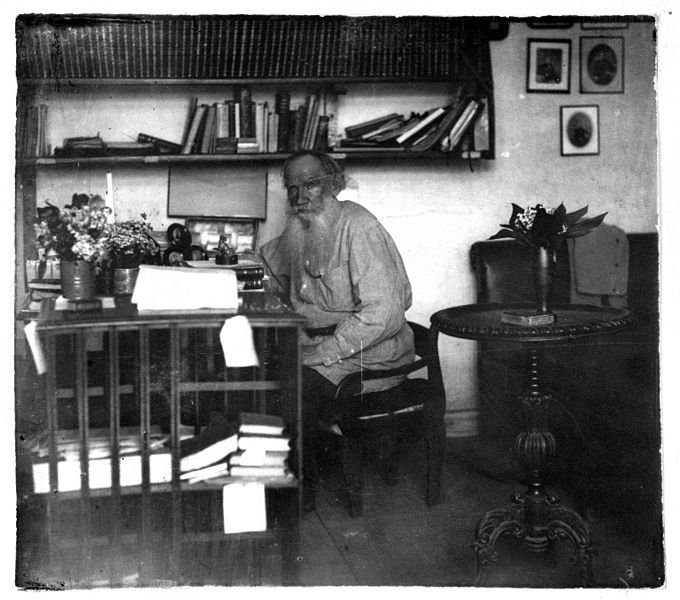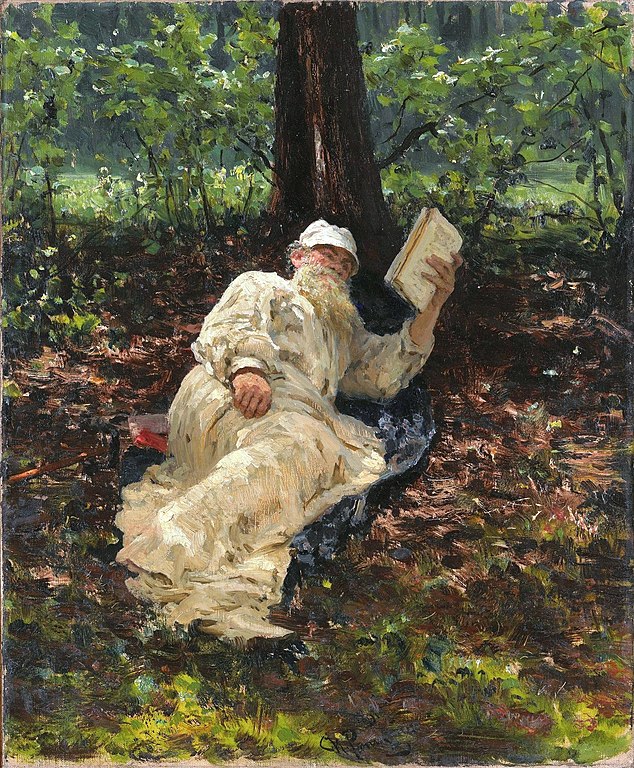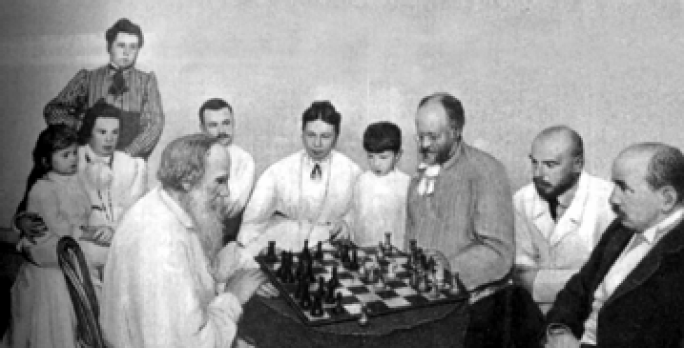
Photo by S. M. Prokudin-Gorsky, 1908

Written as preface to a Russian translation, by Count Sergius Tolstoy, of Edward Carpenter's essay, Modern Science : a Criticism. Tolstoy's words are in bold.

I think this article of Carpenter's on Modern Science should be particularly useful in Russian society, in which, more than in any other in Europe, a superstition is prevalent and deeply rooted which considers that humanity for its welfare does not need the diffusion of true religious and moral knowledge, but only the study of experimental science, and that such science will satisfy all the spiritual demands of mankind.
It is evident how harmful an influence (quite like that of religious superstition) so gross a superstition must have on men's moral life. And, therefore, the publication of the thoughts of writers who treat experimental science and its method critically is specially desirable in our society.
Carpenter shows that neither Astronomy, nor Physics, nor Chemistry, nor Biology, nor Sociology, supplies us with true knowledge of actual facts ; that all the laws discovered by those sciences are merely generalizations, having but an approximate value as laws, and that only as long as we do not know, or leave out of account, certain other factors ; and that even these laws seem laws to us only because we discover them in a region so far away from us in time and space that we cannot detect their non-correspondence with actual fact.
Moreover, Carpenter points out that the method of science, which consists in explaining things near and important to us by things more remote and indifferent, is a false method which can never bring us to the desired result.
He says that every science tries to explain the facts it is investigating by means of conceptions of a lower order: "Each science has been (as far as possible) reduced to its lowest terms. Ethics has been made a question of utility and inherited experience. Political Economy has been exhausted of all conceptions of justice between man and man, of charity, affection, and the instinct of solidarity ; and has been founded on its lowest discoverable factor, namely self-interest. Biology has been denuded of the force of personality in plants, animals, and men ; the 'self' here has been set aside, and the attempt made to reduce the science to a question of chemical and cellular affinities, protoplasm, and the laws of osmosis. Chemical affinities, again, and all the wonderful phenomena of Physics are emptied down into a flight of atoms ; and the flight of atoms (and of astronomic orbs as well) is reduced to the laws of dynamics."
It is supposed that the reduction of questions of a higher order to questions of a lower order will explain the former. But an explanation is never obtained in this way, and what happens is merely that, descending in one's investigations ever lower and lower, from the most important questions to less important ones, science reaches at last a sphere quite foreign to man, with which he is barely in touch, and confines its attention to that sphere, leaving all unsolved the questions most important to him.
What takes place is as if a man, wishing to understand the use of an object lying before him --- instead of coming close to it, examining it from all sides and handling it --- were to retire further and further from it, until he was at such a distance from the object that all its peculiarities of colour and inequalities of surface had disappeared, and only its outline was still visible against the horizon ; and as if, from there, he were to begin writing a minute description of the object, imagining that now, at last, he clearly understood it, and that this understanding, formed at such a distance, would assist a complete comprehension of it.
And it is this self-deception that is partly exposed by Carpenter's criticism, which shows, first, that the knowledge afforded us by the natural sciences amounts merely to convenient generalizations, which certainly do not express actual facts ; and, secondly, that the method of science by which facts of a higher order are reduced to facts of a lower order, will never furnish us with an explanation of the former.

But without predetermining the question whether experimental science will, or will not, by its methods, ever bring us to the solution of the most serious problems of human life, the activity of experimental science itself, in its relation to the eternal and most reasonable demands of man, is so anomalous as to amaze one.
People must live. But in order to live they must know how to live. And all men always obtained this knowledge --- well or ill --- and in conformity with it have lived, and progressed ; and this knowledge of how men should live has from the days of Moses, Solon, and Confucius been always considered a science --- the very essence of science. And only in our time has it come to be considered that the science telling us how to live, is not a science at all, but that only experimental science --- commencing with Mathematics and ending in Sociology --- is real science.
And a strange misunderstanding results.

A plain, reasonable working man supposes, in the old way which is also the common-sense way, that if there are people who spend their lives in study, whom he feeds and keeps while they think for him --- then no doubt these men are engaged in studying things men need to know ; and he expects of science that it will solve for him the questions on which his welfare, and that of all men, depends. He expects science to tell him how he ought to live : how to treat his family, his neighbours and the men of other tribes, how to restrain his passions, what to believe in and what not to believe in, and much else. And what does our science say to him on these matters ?
It triumphantly tells him : how many million miles it is from the earth to the sun ; at what rate light travels through space ; how many million vibrations of ether per second are caused by light, and how many vibrations of air by sound ; it tells of the chemical components of the Milky Way, of a new element --- helium --- of micro-organisms and their excrements, of the points on the hand at which electricity collects, of X rays, and similar things.
"But I don't want any of those things," says a plain and reasonable man --- "I want to know how to live."
"What does it matter what you want ?" replies science. "What you are asking about relates to Sociology. Before replying to sociological questions, we have yet to solve questions of Zoology, Botany, Physiology, and, in general, of Biology ; but to solve those questions we have first to solve questions of Physics, and then of Chemistry, and have also to agree as to the shape of the infinitesimal atoms, and how it is that imponderable and incompressible ether transmits energy."
And people --- chiefly those who sit on the backs of others, and to whom it is therefore convenient to wait --- are content with such replies, and sit blinking, awaiting the fulfilment of these promises ; but a plain and reasonable working man --- such as those on whose backs these others sit while occupying themselves with science --- the whole great mass of men, the whole of humanity, cannot be satisfied by such answers, but naturally ask in perplexity : "But when will this be done ? We cannot wait. You say yourselves that you will discover these things after some generations. But we are alive now --- alive to-day and dead to-morrow --- and we want to know how to live our life while we have it. So teach us !"
"What a stupid and uneducated man !" replies Science. "He does not understand that science exists not for use, but for science. Science studies whatever presents itself for study, and cannot select the subjects to be studied. Science studies everything. That is the characteristic of science."
And scientists are really convinced that to be occupied with trifles, while neglecting what is more essential and important, is a characteristic not of themselves, but of science. The plain, reasonable man, however, begins to suspect that this characteristic pertains not to science, but to men who are inclined to occupy themselves with trifles and to attach great importance to those trifles.

"Science studies everything," say the scientists. But, really, everything is too much. Everything is an infinite quantity of objects ; it is impossible at one and the same time to study all. As a lantern cannot light up everything, but only lights up the place on which it is turned or the direction in which the man carrying it is walking, so also science cannot study everything, but inevitably only studies that to which its attention is directed. And as a lantern lights up most strongly the place nearest to it, and less and less strongly objects that are more and more remote from it, and does not at all light up those things its light does not reach, so also human science, of whatever kind, has always studied and still studies most carefully what seems most important to the investigators, less carefully what seems to them less important, and quite neglects the whole remaining infinite quantity of objects.
And what for men has defined and still defines the subjects they are to consider most important, less important, and unimportant, is the general understanding of the meaning and purpose of life (that is to say, the religion) possessed by those who occupy themselves with science. But men of science to-day --- not acknowledging any religion, and having therefore no standard by which to choose the subjects most important for study, or to discriminate them from less important subjects and, ultimately, from that infinite quantity of objects which the limitations of the human mind, and the infinity of the number of those objects, will always cause to remain uninvestigated --- have formed for themselves a theory of "science for science's sake" according to which science is to study not what mankind needs, but everything.
And, indeed, experimental science studies everything, not in the sense of the totality of objects, but in the sense of disorder --- chaos in the arrangement of the objects studied.
That is to say, science does not devote most attention to what people most need, less to what they need less, and none at all to what is quite useless, but it studies anything that happens to come to hand. Though Comte's and other classifications of the sciences exist, these classifications do not govern the selection of subjects for study, but that selection is dependent on the human weaknesses common to men of science as well as to the rest of mankind. So that, in reality, scientists study not everything, as they imagine and declare, but they study what is more profitable and easier to study.

And it is more profitable to study things that conduce to the well-being of the upper classes, with whom the men of science are connected ; and it is easier to study things that lack life. Accordingly, many men of science study books, monuments, and inanimate bodies.
Such study is considered the most real "science." So that in our day what is considered to be the most real "science," the only one (as the Bible was considered the only book worthy of the name), is, not the contemplation and investigation of how to make the life of man more kindly and more happy, but the compilation and copying from many books into one of all that our predecessors wrote on a certain subject, the pouring of liquids out of one glass bottle into another, the skilful slicing of microscopic preparations, the cultivation of bacteria, the cutting up of frogs and dogs, the investigation of X rays, the theory of numbers, the chemical composition of the stars, etc.
Meanwhile all those sciences which aim at making human life kindlier and happier --- religious, moral, and social science --- are considered by the dominant science to be unscientific, and are abandoned to the theologians, philosophers, jurists, historians, and political economists ; who, under the guise of scientific investigation, are chiefly occupied in demonstrating that the existing order of society (the advantages of which they enjoy) is the very one which ought to exist, and that, therefore, it must not only not be changed, but must be maintained by all means.
Not to mention Theology and Jurisprudence, Political Economy, the most advanced of the sciences of this group, is remarkable in this respect. The most prevalent Political Economy (that of Karl Marx), accepting the existing order of life as though it were what it ought to be, not only does not call on men to alter that order --- that is to say, does not point out to them how they ought to live that their condition may improve --- but, on the contrary, it demands an increase in the cruelty of the existing order of things, that its more-than-questionable predictions may be fulfilled, concerning what will happen if people continue to live as badly as they are now living.
And, as always occurs, the lower a human activity descends --- the more widely it diverges from what it should be --- the more its self-confidence increases. That is just what has happened with the science of to-day.
True science is never appreciated by its contemporaries, but on the contrary is usually persecuted. Nor can this be otherwise. True science shows men their mistakes, and points to new, unaccustomed ways of life. And both these services are unpleasant to the ruling section of society. But present-day science not only does not run counter to the tastes and demands of the ruling section of society, but it quite complies with them : it satisfies idle curiosity, excites people's wonder, and promises them increase of pleasure. And so, whereas all that is truly great is calm, modest and unnoticed, the science of to-day knows no limits to its self-laudation.
"All former methods were erroneous, and all that used to be considered science was an imposture, a blunder, and of no account. Only our method is true, and the only true science is ours. The success of our science is such that thousands of years have not done what we have accomplished in the last century. In the future, travelling the same path, our science will solve all questions, and make all mankind happy. Our science is the most important activity in the world, and we, men of science, are the most important and necessary people in the world."
So think and say the scientists of to-day, and the cultured crowd echo it, but really at no previous time and among no people has science --- the whole of science with all its knowledge --- stood on so low a level as at present. One part of it, which should study the things that make human life kind and happy, is occupied in justifying the existing evil order of society ; another part is engaged in solving questions of idle curiosity.
"What? --- Idle curiosity ?" I hear voices ask in indignation at such blasphemy. "What about steam, and electricity, and telephones, and all our technical improvements ? Not to speak of their scientific importance, see what practical results they have produced ! Man has conquered Nature and subjugated its forces ... " with more to the same effect.
"But all the practical results of the victories over Nature have till now --- for a considerable time past --- gone to factories that injure the workmen's health ; have produced weapons to kill men with, and increased luxury and corruption" --- replies a plain, reasonable man --- "and, therefore, the victory of man over Nature has not only failed to increase the welfare of human beings, but has, on the contrary, made their condition worse."
If the arrangement of society is bad (as ours is), and a small number of people have power over the majority and oppress it, every victory over Nature will inevitably only serve to increase that power and that oppression. That is what is actually happening.
With a science which aims not at studying how people ought to live, but at studying whatever exists --- and which is therefore occupied chiefly in investigating inanimate things while allowing the order of human society to remain as it is --- no improvements, no victories over Nature, can better the state of humanity.
"But medical science ? You are forgetting the beneficent progress made by medicine. And bacteriological inoculations? And recent surgical operations?" exclaim the defenders of science, --- adducing as a last resource the success of medical science to prove the utility of all science. "By inoculations we can prevent illness, or can cure it ; we can perform painless operations : cut open a man's inside and clean it out, and can straighten hunched-backs," is what is usually said by the defenders of present-day science, who seem to think that the curing of one child from diphtheria, among those Russian children of whom 50 per cent, (and even 80 per cent, in the Foundling Hospitals) die as a regular thing apart from diphtheria --- must convince anyone of the beneficence of science in general.

Our life is so arranged that from bad food, excessive and harmful work, bad dwellings and clothes, or from want, not children only, but a majority of people, die before they have lived half the years that should be theirs. The order of things is such that children's illnesses, consumption, syphilis and alcoholism seize an ever-increasing number of victims, while a great part of men's labour is taken from them to prepare for wars, and every ten or twenty years millions of men are slaughtered in wars ; and all this because science, instead of supplying correct religious, moral and social ideas, which would cause these ills to disappear of themselves, is occupied on the one hand in justifying the existing order, and on the other hand --- with toys. And, in proof of the fruitfulness of science, we are told that it cures one in a thousand of the sick, who are sick only because science has neglected its proper business.
Yes, if science would devote but a small part of those efforts, and of that attention and labour which it now spends on trifles, to supplying men with correct religious, moral, social, or even hygienic ideas, there would not be a one-hundredth part of the diphtheria, the diseases of the womb, or the deformities, the occasional cure of which now makes science so proud, though they are effected in clinical hospitals, the cost of whose luxurious appointments is too great for them to be at the service of all who need them.
It is as though men who had ploughed badly, and sown badly with poor seeds, were to go over the ground tending some broken ears of corn and trampling on others that grew alongside, and should then exhibit their skill in healing the injured ears, as a proof of their knowledge of agriculture.
Our science, in order to become science and to be really useful and not harmful to humanity, must first of all renounce its experimental method, which causes it to consider as its duty the study merely of what exists, and must return to the only reasonable and fruitful conception of science, which is, that the object of science is to show how people ought to live. Therein lies the aim and importance of science ; and the study of things as they exist can only be a subject for science in so far as that study co-operates towards the knowledge of how men should live.
It is just to the admission of its bankruptcy by experimental science, and to the need of adopting another method, that Carpenter draws attention in this article.

CONTENTS: